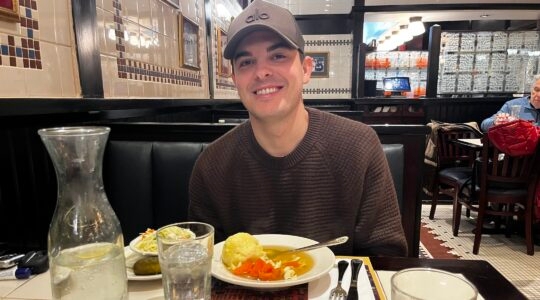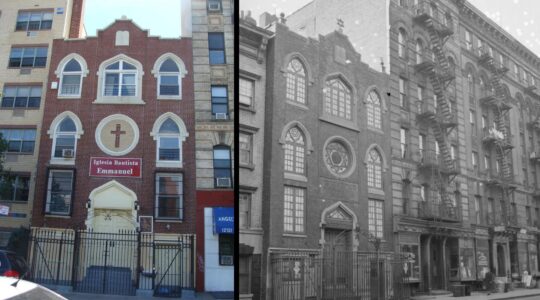Another Sundance Film Festival is over, which means it’s time to short your stock in Chap Stick.
The annual event, held atop of a fakakte mountain in the middle of fakakte January, where you wake up each morning feeling like someone shoved a Triscuit up your nose, is the kickoff to a new year of movies and, despite the slush and the crowded shuttles, still manages to be a good time.
101 feature films debuted this year, so I only saw a fraction — but here are some films and performances that will likely be of interest to Members of the Tribe.
“The Tale,” which was snapped up by HBO, was without question the talk of the festival. It is an autobiographical film by a documentarian named Jennifer Fox, and quite unlike anything I’ve seen before. It is a cinematic “conversation” between an adult woman and her younger self, and as the film plays out she comes to the realization that the older couple she held as mentors when she was a child were actually sexual predators.
Fox has been making films for over 20 years, oftentimes about abused women, even though it never dawned on her that she was one herself.
“The Tale” is her first scripted drama, with Laura Dern playing the role of “Jennifer Fox.” (Laura Dern isn’t quite so Jewish-looking as Fox actually is, but she is perfect in the role we’ll let it slide.)
While the film is never graphic (and the scenes detailing physical abuse were done with trick photography and adult doubles) there is a penetrating psychological quality to this deeply unsettling film. Rarely have I seen the nuances of self-deception and the malleability of truth so well dramatized.
This is a vital movie, but also deeply disturbing. It’s sad to say, but it should be seen by kids (Fox was a pre-pubescent 13 when she was entrapped), but with their parents. Parents should then immediately book it to their therapist’s the minute after their post-screening talk.
In addition to Jennifer Fox, another Jewish woman was a star of the festival, and this was a bit more upbeat. Justice Ruth Bader Ginsburg was everywhere you looked, and at age 84 still needed less help on the ice than I did.
“RBG,” a documentary produced by CNN Films, is straightforward but engaging. It is a standard collection of old clips and interviews, highlighting her achievements for gender equality, as well as the remarkable hurdles she jumped at Cornell, Harvard and Columbia Universities, all while raising a family.
The most common comment I heard about the movie was how “romantic” it was. Justice Ginsburg is a strong and independent woman, but has a sense of humor. The scenes concerning her very progressive late husband Martin are tremendously sweet, and this movie will do nothing but fan the flames of her current pop cult status.
The only Israeli production at the festival was “The Oslo Diaries,” which, like “RBG,” is a documentary that will captivate audiences that have a pre-existing interest in the subject matter, but isn’t exactly groundbreaking. It is a highly detailed look at the Oslo Accords between Israel and the PLO, from their secret origins to their fizzle after the assassination of prime minister Yitzhak Rabin.
While directors Mor Loushy and Daniel Sivan find many nuggets in old video footage (their interview with Shimon Peres is the last he ever gave) this is basically a step-by-step about people in meetings – which isn’t really all that riveting.
The film doesn’t lay specific blame (though young Benjamin Netanyahu doesn’t come off too well in retrospect) but I must say it is shocking to see any film in a liberal American environment like Sundance where a narrator calls Yasser Arafat a terrorist.
This may seem like common sense to most people in the real world, but you may not know what it’s like out here for many of us. (Note: I’ve never voted for a Republican in my life, but say anything nuanced about Israel in an artsy circle right now and people look at you like you have spiders crawling out of your nose.)
The PLO plays a big part in the rather slick and engaging spy flick “Beirut.”
Set in 1982 just before the situation got truly bad, John Hamm stars as a former foreign diplomat who returns to Lebanon when one of his old work associates is kidnapped. The fate of Middle East hinges on Hamm’s ability to talk and make deals. Luckily, this is what he does best. The American will be returned if Hamm can somehow convince Israel to give him a specific Palestinian terrorist to trade. But do the Israelis even have him?
The film is based on an original screenplay by Tom Gilroy but when it is working best it feels adapted from a John Le Carré novel, and that’s about the highest praise I can give.
Sundance also saw the premiere of the American remake of a recent Israeli film, “The Kindergarten Teacher.” With a few key exceptions this is almost a one-to-one transfer of the original, in which a nurturing kindergarten teacher notices the almost supernatural abilities of one of her charges.
Though only five years old, he enters something of a trance and spouts off beautiful, well-beyond-his-years poetry. She becomes attached to the child and grows weary when the rest of the world seems disinterested in his talent.
Maggie Gyllenhaal (raised Jewish) plays Lisa Spinelli of Staten Island in this version – but an outer borough Italian yearning to foster a child’s arts education is basically an honorary Jew if you ask me. While there are some differences in this remake, the main selling point is Gyllenhaal’s performance, which pivots from sympathetic to frightening so subtly you barely see it happening.
Maggie’s brother Jake had a film at Sundance, too. How sweet! His was a supporting role in “Wildlife,” a melodrama set in 1960 directed by actor Paul Dano.
Jake plays a nice guy who keeps messing up; the friendliest fella you’ll ever meet, but who just can’t do what the boss says and can’t get the bills paid. His last chance is to go off and fight wildfires (this is set in Montana), and with him out of the picture the movie (starring Carey Mulligan) can really heat up. Jake still returns for the final blaze.
Another ridiculously talented and good-looking Jewish boy, Paul Rudd, was the star of the peculiar and amusing “The Catcher Was A Spy.” This is the stranger-than-fiction tale of Moe Berg, the polymath genius who spoke numerous languages and was a major league baseball player in the 1930s and 40s.
After the war broke out he joined the OSS and, on one assignment, went to Switzerland to suss out the development of the German atomic project. If he gleaned that they were advancing, he had orders to kill their lead scientist. That scientist was the inscrutable Werner Heisenberg, who you may remember from the Heisenberg Uncertainty Principle. (Yes, sometimes life just really lines it up for ya.) Anyway, it’s a fun picture, and when it comes out in April you should go see it.
Finally, I saw the abundantly gifted but a little bit meshugga Joaquin Phoenix (mother Arlyn Dunetz of The Bronx) as John Callahan in “Don’t Worry, He Won’t Get Far On Foot.”
It’s another biopic, this time about the acerbic cartoonist who found his voice (and some stability) only after he got in an accident and lost the use of his legs and arms, but not his hands. The film is less about his artwork than about his arc toward sobriety. It may very well be the most realistic film about the 12-step process I’ve ever seen.
Phoenix’s oddball persona works wonderfully here, and there’s a good chance you’ll be hearing his name around this time next year during awards season. Slow and steady wins the race, as they say.
The New York Jewish Week brings you the stories behind the headlines, keeping you connected to Jewish life in New York. Help sustain the reporting you trust by donating today.




